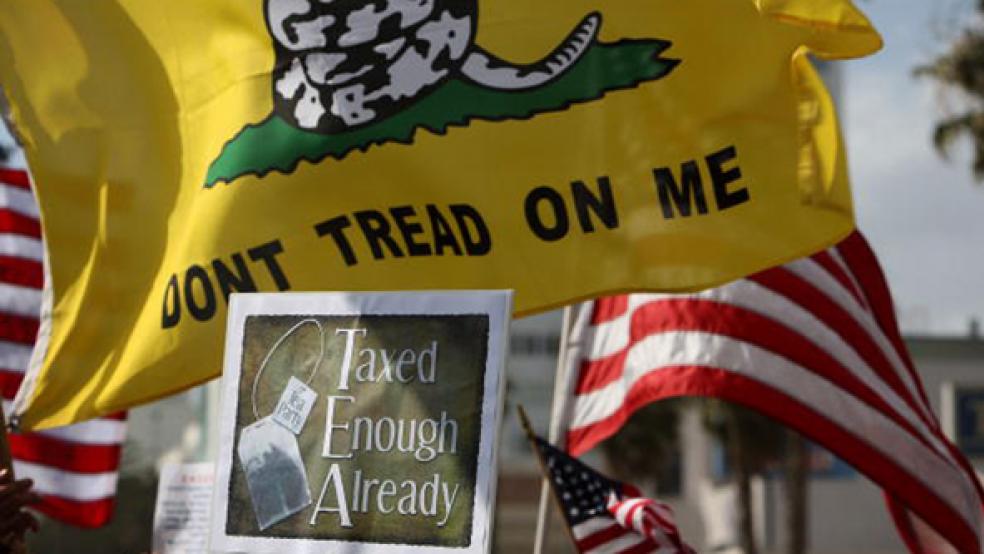Conservatism offers a winning agenda to people who want to be upwardly mobile—that is, almost everyone. In contrast, the liberal agenda focuses on keeping Americans safe, with an emphasis on food stamps, government-provided health insurance, retirement benefits, and paid sick and maternity benefits.
The liberal agenda is seductive. But more people want to be upwardly mobile than dependent. No one wants to grow up and live off food stamps. Even those who are no longer upwardly mobile—those who have retired from the labor force—want their children and grandchildren to have opportunities.
Related: The 25 House Conservatives Who Could Kill Boehner's Agenda
The statistic that 50 percent of the population is dependent on the government and pays no taxes is misleading because it implies there is a permanent underclass living off Uncle Sam. In reality, the workforce is in constant flux and people are interested in upward mobility for themselves or other family members. They might start and end their careers getting more out of government than they pay in taxes in a given year, and have periods of unemployment, but in between, they pay what the Internal Revenue Service requires.
It is typical for new entrants to the workforce, especially those without any college education, to qualify for programs including the Earned Income Tax Credit, food stamps, and housing vouchers. Once their earnings increase, and they marry another earner, they start paying taxes. When they retire, they again become recipients, this time of Social Security and Medicare. Only a small share of the population is on government benefits throughout their lives.
Some of this flux can be seen from data published by the Bureau of Labor Statistics, entitled the Job Openings and Labor Turnover Survey data. The latest data show that in 2014 annual hires increased to 59 million (42 percent of employment) and annual total separations rose to 55 million (40 percent of employment). Labor turnover is lower than before the Great Recession, but a significant share of the labor force is moving around.
Related: You Could Be $51,000 Richer
Liberal policies are here for us when we are down. They are our safety net. In return for a higher chunk of our paychecks, and higher health insurance premiums, liberals will look after us. But liberals aren’t telling people how to be better off. That’s where conservatives come in. Their policies help people get ahead, which is what they fundamentally want to do.
Conservatives want smaller federal deficits. By lowering the growth of spending from 5 percent per year to 3 percent per year, congressional Republicans in their recent budget resolutions have proposed to bring the budget into surplus in 2025. Think of what that means for future generations. They would only have to pay for their own spending, not for the spending of the parents and grandparents. Of course, conservative policies like these budget resolutions are going to be derided as cuts that hurt the poor. But government spending is still projected to rise, just at a slower rate than before. Over the next 10 years, interest on the debt would decline by almost $800 billion.
Conservatives want lower taxes. Conservatives have published a number of proposals for lowering individual and business taxes and streamlining the tax code. In contrast, liberals constantly call for tax increases on corporations and “the rich.” One recent proposal, the Lee-Rubio tax proposal, would lower the top corporate and small business tax rate to 25 percent and have two tax rates, 15 percent and 35 percent, for individuals. Lower taxes make it easier for people to start businesses and get ahead. Businesses expand and employ more people, and people keep more money and spend it, creating more jobs. Lower taxes both help people become upwardly mobile and reward those who achieve such mobility.
Related: The Compelling Case for Lower Capital Gains Tax Rates
Conservatives favor school choice. One of the biggest divisions between conservatives and liberals is over school choice. Liberals want to protect unqualified teachers and are vehemently opposed to programs that allow children to change schools. In his most recent budget, President Obama once again tried to end the D.C. Opportunity Scholarship Program which gives scholarships to Washington D.C. residents to send children to schools of their choice (even though the president sends his daughters to the private Sidwell Friends School). The Department of Justice sued Louisiana for its school choice program, a suit later withdrawn. A better education pays off in terms of higher graduation rates and higher lifetime earnings, and conservatives are on the side of better education for kids.
Conservatives favor expansion of oil pipelines. Most liberals are against expanding America’s pipeline infrastructure, even though the spread of cheap energy will attract manufacturing and produce jobs. Conservatives want job opportunities for refinery workers along the Gulf of Mexico who want to refine Canadian oil. These refinery jobs dwarf the ones that would be created by pipeline construction. But Keystone XL is only a drop in the barrel, so to speak. Conservatives support a whole new generation of pipelines to get the newly-found oil and gas to refineries and then out to consumers and to the coasts for export. At the end of 2014, oil produced in North Dakota was selling for about $5 per barrel less than U.S. oil produced elsewhere—because it could not be transported out. Liberals don’t want pipelines.
Related: 5 Niche Sectors with Very Nice Profit Margins
Conservatives favor smaller, more flexible ways of providing healthcare. Liberals are citing the new statistic of 11 million who have signed up for Obamacare as evidence of the program’s success. But those who are not offered insurance by their employers have few other options these days other than going to the exchanges. Policies that do not comply with Affordable Care Act guidelines are hard to find these days. Therefore new customers have to buy insurance through the exchanges, even though it is more expensive and less desirable than their old plans. The forthcoming Supreme Court decision in King v. Burwell is spurring many proposals on Capitol Hill in case the Justices invalidate Obamacare subsidies in 34 states. A variety of conservative proposals, such as the one I authored with Grace-Marie Turner in The New York Times, would free states from the shackles of Obamacare.
Conservatives want fewer regulations. Conservatives want fewer regulations, liberals want more. The Environmental Protection Agency is having a field day regulating mercury, ozone, and carbon, even though on statistics from its own website people can see that the air is getting cleaner every year. The ozone standards put in place under President George W. Bush have yet to take effect, but EPA has called comments on new ones. Under these new regulations, states would have to submit State Implementation Plans to the EPA for approval. These State Implementation plans would require a reduction in power plants, factories, and vehicles on the road in order for states to come into compliance. This means less economic activity and fewer jobs.
America has gradually emerged from the Great Recession, and people are looking to the future. They want more than handouts, they want upward mobility. That’s why Republicans picked up seats in the U.S. House and Senate, as well as in state legislatures and governorships, including the liberal bastions of Maryland, Massachusetts, and Illinois. Until liberals can offer their own opportunity agenda, modern conservatism will have an advantage.
Diana Furchtgott-Roth is the director of the Economics21 program at the Manhattan Institute for Policy Research. You can follow her on Twitter here.
Top Reads from The Fiscal Times:







